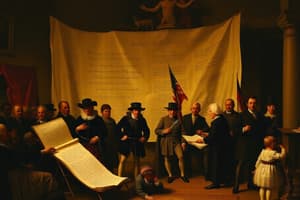Podcast
Questions and Answers
What was the Proclamation of 1763?
What was the Proclamation of 1763?
The Proclamation of 1763 didn't let colonists settle on the Native American's land.
What was the purpose of the Proclamation of 1763?
What was the purpose of the Proclamation of 1763?
The purpose of the Proclamation of 1763 was to stabilize the relationship between the colonists and the Native Americans.
Why were the colonists upset about the Proclamation of 1763?
Why were the colonists upset about the Proclamation of 1763?
The colonists were upset about the Proclamation of 1763 because they wanted to settle in the land they were forbidden to settle in.
What was the significance of the Treaty of Paris 1763?
What was the significance of the Treaty of Paris 1763?
Who was the author of the Join or Die cartoon?
Who was the author of the Join or Die cartoon?
Why did the colonists oppose paying taxes?
Why did the colonists oppose paying taxes?
Why did Britain tax the colonies in North America?
Why did Britain tax the colonies in North America?
What did the Navigation Acts state and/or tax?
What did the Navigation Acts state and/or tax?
What did the Townshend Act state and/or tax?
What did the Townshend Act state and/or tax?
What did the Writs of Assistance state and/or tax?
What did the Writs of Assistance state and/or tax?
What did the Stamp Act state and/or tax?
What did the Stamp Act state and/or tax?
What did the Quartering Act state and/or tax?
What did the Quartering Act state and/or tax?
What did the Intolerable Act state and/or tax?
What did the Intolerable Act state and/or tax?
What did the Tea Act state and/or tax?
What did the Tea Act state and/or tax?
What was the Boston Tea Party?
What was the Boston Tea Party?
Does Paul Revere's image of the Boston Massacre accurately represent what actually happened?
Does Paul Revere's image of the Boston Massacre accurately represent what actually happened?
What was the outcome of the Boston Massacre trial?
What was the outcome of the Boston Massacre trial?
Flashcards are hidden until you start studying
Study Notes
Proclamation of 1763
- Prohibited colonial settlement west of the Appalachian Mountains to protect Native American lands.
- Aimed to stabilize colonial-Native American relations post-French and Indian War.
- Colonists felt frustrated due to restrictions on expansion into desired territories.
Treaty of Paris 1763
- Established peace between Britain and France after the French and Indian War.
- Marked a significant territorial gain for Britain, which increased tensions among colonists.
Join or Die Cartoon
- Created by Benjamin Franklin to promote colonial unity.
- Aimed to encourage cooperation among colonies against French threats.
Taxation and Representation
- Colonists opposed taxes imposed by Britain due to the lack of representation in Parliament.
- Resentment grew as colonists felt they were unfairly burdened with taxes to repay British war debts.
Navigation Acts
- Mandated that all goods imported to England be carried by English ships, requiring English crews.
- Colonists protested due to increased costs for shipping, preferring non-English crew options.
Townshend Act
- Imposed taxes on imported goods including lead, paint, paper, glass, and tea.
- Colonists responded with anger, emphasizing their grievance of "Taxation without Representation."
Writs of Assistance
- Gave British officers authority to search colonial properties for smuggled goods without warrants.
- Sparked outrage among colonists who felt their privacy and property rights were violated.
Stamp Act
- Required a government tax stamp on legal documents, including contracts and licenses.
- Colonists protested this direct taxation as an unfair imposition without representation.
Quartering Act
- Mandated that colonists provide housing for British soldiers.
- Colonists were frustrated, seeing it as an invasion of their homes and autonomy.
Intolerable Acts
- Closed Boston's port and increased royal control over Massachusetts in response to the Boston Tea Party.
- Colonists viewed this as a major infringement on their rights and liberties.
Tea Act
- Allowed the East India Tea Company to sell tea directly to colonists, undercutting smuggled Dutch tea prices.
- Colonists remained opposed due to the underlying tax implications and lack of representation.
Boston Tea Party
- A direct protest against the Tea Act where colonists dumped British tea into Boston Harbor.
- Highlighted colonial resistance to "Taxation Without Representation."
Boston Massacre
- Paul Revere's depiction was biased, portraying British soldiers as brutal aggressors against innocent colonists.
- The trial of the soldiers resulted in a not guilty verdict, supported by the evidence presented, which stressed self-defense.
Studying That Suits You
Use AI to generate personalized quizzes and flashcards to suit your learning preferences.



